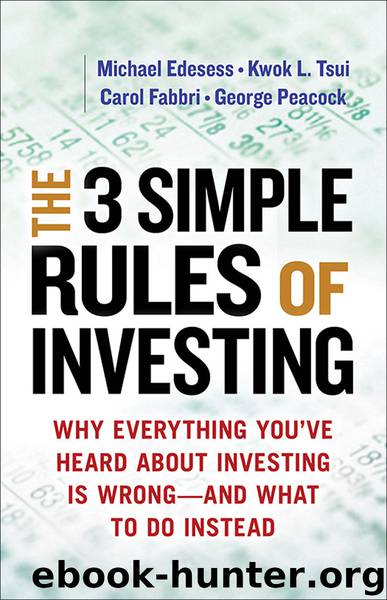The 3 Simple Rules of Investing by Michael Edesess

Author:Michael Edesess
Language: eng
Format: epub, mobi
Publisher: Berrett-Koehler Publishers
Published: 2014-12-27T16:00:00+00:00
THE HEDGE FUND DIVERSIFICATION MYTH
One of the ways hedge funds are sold is as “diversification” for an investor’s portfolio. Hedge funds sometimes lay claim to diversification value through the very names of their funds. For example, “absolute return” is the name of a whole so-called asset class of hedge funds. Absolute return funds were meant to provide a return that wasn’t correlated with the stock market—that is, a return that wouldn’t go up when the market as a whole went up, and down when the market as a whole went down. They were supposed to provide an “absolute” return instead of a return that was “relative” to the fluctuations of the market. Their name implied the promise that they would go up in value whether the stock market went up or down.
Funny, they didn’t turn out that way. Absolute return funds were among the worst-performing hedge funds when the market as a whole plummeted during the financial crisis.1 But they managed to get sold on their name, anyway.
Let’s take another kind of hedge fund sold as diversification. One category of hedge funds is called “long-short equity.” This was the type of hedge fund pioneered by hedge fund manager Alfred Winslow Jones, whom we will encounter in Deadly Temptation #6. In a long-short equity fund, the idea is to buy stocks you think will go up, and “short” stocks—that is, sell them—that you think will go down. If you’re right (a very, very, very big if!), you make money whether the market as a whole goes up or down.
Oddly, most long-short equity hedge funds don’t do it in equal amounts; typical is 70% long and 30% short. So they’re—on balance—“long” the market; that is, they’ll tend to fluctuate with the market. No matter: if they get the buys and sells right, the fund will do well, of course.
But there’s a big problem with the idea right out of the box. Mutual funds have shown quite clearly that professional investment managers don’t get it right. Mutual funds can only buy stocks or sell stocks that they own—they’re not allowed to short them—but as we showed in Deadly Temptation #1, they’ve proven from their record that they don’t get the buys and sells right any better than the proverbial chimpanzee throwing darts at the stock page of the Wall Street Journal.
Even though mutual fund managers can’t short stocks, if there’s a stock they don’t like, they could just not buy it and buy more of a stock they like instead. If they really knew which stocks were going to go down, they could easily beat the market that way. But they don’t. Their record of failing to beat a market index shows that they don’t know that.
So why would a long-short equity hedge fund know it if mutual funds don’t? The hedge funds’ argument is that before becoming hedge fund managers, these financial services pros were the best of the breed of mutual fund managers. They quit to start hedge funds because they have more investment freedom with unregulated hedge funds, and they’ll be paid more.
Download
The 3 Simple Rules of Investing by Michael Edesess.mobi
This site does not store any files on its server. We only index and link to content provided by other sites. Please contact the content providers to delete copyright contents if any and email us, we'll remove relevant links or contents immediately.
| Analysis & Strategy | Bonds |
| Commodities | Derivatives |
| Futures | Introduction |
| Mutual Funds | Online Trading |
| Options | Portfolio Management |
| Real Estate | Stocks |
Rich Dad Poor Dad by Robert T. Kiyosaki(6605)
Pioneering Portfolio Management by David F. Swensen(6288)
How To Win Friends and Influence People by Dale Carnegie(4498)
The Money Culture by Michael Lewis(4196)
The Dhandho Investor by Mohnish Pabrai(3758)
The Wisdom of Finance by Mihir Desai(3728)
Liar's Poker by Michael Lewis(3441)
Fooled by Randomness: The Hidden Role of Chance in Life and in the Markets by Nassim Nicholas Taleb(3105)
The ONE Thing by Gary Keller(3062)
The Intelligent Investor by Benjamin Graham Jason Zweig(3035)
Mastering Bitcoin: Programming the Open Blockchain by Andreas M. Antonopoulos(3035)
The Psychology of Money by Morgan Housel(2970)
Investing For Dummies by Eric Tyson(2948)
Rich Dad Poor Dad: What The Rich Teach Their Kids About Money - That The Poor And Middle Class Do Not! by Robert T. Kiyosaki(2948)
How to Day Trade for a Living: Tools, Tactics, Money Management, Discipline and Trading Psychology by Andrew Aziz(2942)
How to Win Friends and Influence People by Dale Carnegie(2905)
Market Wizards by Jack D. Schwager(2696)
How to Pay Zero Taxes, 2018 by Jeff A. Schnepper(2646)
Zero Hour by Harry S. Dent Jr. & Andrew Pancholi(2644)
